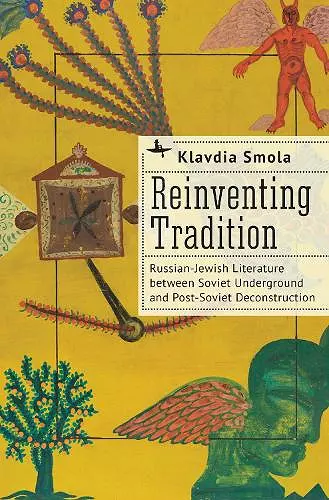Reinventing Tradition
Russian-Jewish Literature between Soviet Underground and Post-Soviet Deconstruction
Format:Hardback
Publisher:Academic Studies Press
Published:25th Jul '23
Currently unavailable, and unfortunately no date known when it will be back

How was the Jewish tradition reinvented in Russian-Jewish literature after a long period of assimilation, the Holocaust, and decades of Communism? The process of reinventing the tradition began in the counter-culture of Jewish dissidents, in the midst of the late-Soviet underground of the 1960-1970s, and it continues to the present day. In this period, Jewish literature addresses the reader of the ‘post-human’ epoch, when the knowledge about traditional Jewry and Judaism is received not from the family members or the collective environment, but rather from books, paintings, museums and popular culture.
Klavdia Smola explores how contemporary Russian-Jewish literature turns to the traditions of Jewish writing, from biblical Judaism to early-Soviet (anti-)Zionist novels, and how it ‘re-writes’ Haskalah satire, Hassidic Midrash or Yiddish travelogues.
“It is well known that a driving force for the formation of underground cultures in former republics of the USSR was the national revival. In her excellent monograph, Klavdia Smola, a prominent scholar of the Soviet nonconformism, focuses on underground literature born by Jewish national revival—a decentralized process that engaged Jews from all republics and regions of the Soviet Union. She meticulously reconstructs a cultural dimension of the political movement for Jewish immigration from the USSR and through the analysis of Russophone Jewish underground literature, traces the development of its main myths and discourses, from their emergence in the 1960s prose of exodus to their ironic deconstructions in postmodernist writings of the 1980s-90s and essentialization in neo-Zionist narratives in the 2000s. This book will be invaluable not only for students of Jewish cultural history but also in courses on national revival in the late Soviet Union and on Russophone literature as a growing new field of studies. Klavdia Smola’s book is pioneering in all these directions.”
— Mark Lipovetsky, Columbia University
“Klavdia Smola’s superbly researched and deeply illuminating book is a must have for anyone interested in the pathways of Jewish creativity in Russian during the late Soviet and post-Soviet epochs. Especially noteworthy are Smola’s intricate readings of the little known writers who were part of the underground scene in the Soviet Union and later immigrated to Israel. With its breadth of the material covered and innovative theoretical approaches, Smola’s volume makes an invaluable contribution to the study of Russian Jewish literature and culture.”
— Marat Grinberg, Professor of Russian and Humanities, Reed College, Author of The Soviet Jewish Bookshelf: Jewish Culture and Identity between the Lines
“The course of Russian-Jewish literature never did run smooth: not when most Russian-speaking Jews were forced by the Tsars to live within the Pale of Settlement; not under Lenin, Stalin, Khrushchev et al.; not after the collapse of the Soviet Empire—how much less so with the successive waves of mass Jewish emigration to Israel, Germany, and North America. Only an expert cartographer like Klavdia Smola, therefore, could see what no one else has seen: that it was through prose fiction and storytelling that three generations of Russian-Jewish writers have constructed their own ‘bridge of longing’ across the historical abyss. As this densely argued book demonstrates, the story doesn’t end with those who experienced corporate Jewish life first-hand. Rather, through all the tricks of the literary trade and by drawing creatively from a century of modern Yiddish writing, they succeeded in fashioning a complex new identity and a new Jewish mythology.”
— David G. Roskies, Emeritus Professor of Yiddish Literature and Culture, the Jewish Theological Seminary
ISBN: 9798887191904
Dimensions: 234mm x 156mm x 24mm
Weight: 776g
428 pages